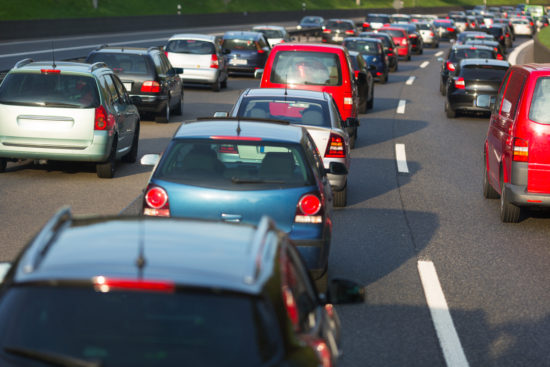Challenging Obama-Era Fuel Economy Standards: A Discussion with Professor Deborah Sivas and Ben DeGolia

Cars and trucks account for nearly one-fifth of U.S. greenhouse gas emissions. But fuel economy standards intended to limit emissions impact have been challenged by the current administration, setting the stage for a legal battle.
“I grew up in L.A. in the ’60s. The air was always terrible. Every time I ran or exercised, my lungs burned,” says Professor Joe Bankman, co-host of Stanford Legal, in a recent interview with environmental law expert Professor Deborah Sivas and law student Ben DeGolia, JD/MS ’19. Sivas, director of Stanford Law School’s Environmental Law Clinic, who, along with clinic staff and students, was involved in some of the litigation that led to the current rules for fuel economy standards—rules that helped to dramatically improve air quality in not only Los Angeles and California but across the country.
“The only way to really reduce greenhouse gas emissions as opposed to these other traditional pollutants is to either switch the technology or get very high gas standards,” says Sivas, JD ’87, Luke W. Cole Professor of Environmental Law. Sivas’s litigation successes include challenging the Bush administration’s gas mileage standards for SUVs and light trucks and holding the U.S. Environmental Protection Agency accountable for regulating the discharge of invasive species in ship ballast water.
The Corporate Average Fuel Economy (CAFE) standards were first enacted by the United States Congress in 1975 to regulated automobile fuel emissions and improve the average fuel economy of cars and light trucks. In 2010, the Obama administration introduced a plan to cut greenhouse gases and spur innovation by steadily raising the CAFE standards to a target of 54.5 miles per gallon for new vehicles by 2025. The plan was announced as part of Obama’s bailout of the auto industry, and it received widespread industry and environmentalist support. In one of its biggest blows to Obama’s environmental reforms, the Trump administration announced that it plans to severely curtail Obama’s CAFE reforms. The Trump administration has proposed holding the CAFE standards to 37 mpg in 2020.
“So the way these standards get set is kind of on a rolling five-year basis, so that the auto industry can plan its production for the next five years. We had this big deal, and during the 2012 to ’16/’17 period, standards ramped up very slowly. But then they’re supposed to ramp up very quickly. By 2025, we’re supposed to get close to 55 miles per gallon as the corporate fuel economy standards,” explains Sivas.
In addition to reforming CAFE, the Trump administration has announced plans to revoke California’s waiver under the Clean Air Act. California has a waiver that allows the state to set its own air quality standards—something that can be traced back to the 1960s, when smog had become an enormous problem in the Los Angeles basin, and California was moving ahead of the federal government in trying to reduce air pollution. When Congress passed the Clean Air Act, it allowed California—but only California—to seek a “waiver” from the preemption provision. Although other states are not allowed to adopt their own standards, all states are permitted to adopt California’s standards. Currently, 13 states and the District of Columbia have adopted California’s more stringent emissions standards. The Obama plan would have raised the national standard to California’s.
“I became really interested in the vulnerability of California’s existing waiver to set its own vehicle emission standards under the Clean Air Act. Over time, my interests sort of narrowed and I decided to focus my research on the threshold question of the legal authority of the Trump administration to revoke a waiver that had already granted several years ago,” says DeGolia, a former clinic student, who is working with Sivas on research looking into whether the EPA is able to revoke California’s waiver under the Clean Air Act.
“There will be big lawsuits if the Trump administration follows through with its plan to roll back standards and revoke the waiver,” says Sivas. “California will be involved. A lot of the other stakeholders will be involved. We, even in our own clinic, have been involved in some of that litigation already.”
You can listen to Stanford Legal on SiriusXM Insight Channel 121, iTunes, SoundCloud, and YouTube.
This episode originally aired on SiriusXM on May 11, 2019.

